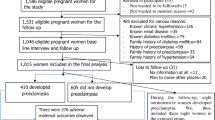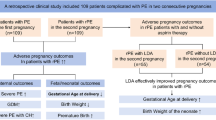Abstract
Preeclampsia is a pregnancy-specific disorder and a leading cause of morbidity and mortality in both women and fetus. Although women with early severe preeclampsia are generally considered to require expedious delivery, expectant management may benefit for pregnancy prolongation. We performed a retrospective analysis of expectant management in early-onset preeclampsia, with or without fetal grow restriction (FGR) over a 6-year period, to investigate whether these women benefit from expectant management. Data including clinical parameters and liver and renal function from 186 nulliparous women with early-onset preeclampsia were analysed. In women with early-onset preeclampsia, 76.8% were delivered after 48 h and the median pregnancy prolongation was 8 days, whereas 23.2% were delivered within 48 h. There was no difference in maternal parameters, liver or renal functions between women in these two groups, regardless of the severity of preeclampsia. However, the stillbirth number was higher in preeclamptic women delivered after 48 h compared with those delivered within 48 h. Our study demonstrates that the decision for immediate delivery or expectant management was not associated with clinical parameter or laboratory biomarker of liver and renal function. However, the risk of stillbirth should still be taken into consideration when making the decision for immediate delivery or expectant management in the clinic.
This is a preview of subscription content, access via your institution
Access options
Subscribe to this journal
Receive 12 digital issues and online access to articles
$119.00 per year
only $9.92 per issue
Buy this article
- Purchase on Springer Link
- Instant access to full article PDF
Prices may be subject to local taxes which are calculated during checkout
Similar content being viewed by others
References
Sibai B, Dekker G, Kupferminc M . Pre-eclampsia. Lancet 2005; 365 (9461):785–799.
Duley L . The global impact of pre-eclampsia and eclampsia. Semin Perinatol 2009; 33 (3): 130–137.
Gupta LM, Gaston L, Chauhan SP . Detection of fetal growth restriction with preterm severe preeclampsia: experience at two tertiary centers. Am J Perinatol 2008; 25 (4): 247–249.
Liu A, Wen SW, Bottomley J, Walker MC, Smith G . Utilization of health care services of pregnant women complicated by preeclampsia in Ontario. Hypertens Pregnancy 2009; 28 (1): 76–84.
Schiff E, Friedman SA, Sibai BM . Conservative management of severe preeclampsia remote from term. Obstet Gynecol 1994; 84 (4): 626–630.
Odendaal HJ, Pattinson RC, Bam R, Grove D, Kotze TJV . Aggressive or expectant management for patients with severe preeclampsia between 28-34 weeks gestation-a randomized controlled trial. Obstet Gynecol 1990; 76 (6): 1070–1075.
Sibai BM, Mercer BM, Schiff E, Friedman SA . Aggressive versus expectant management of severe preeclampsia at 28 to 32 weeks gestation-a randomized controlled trial. Am J Obstet Gynecol 1994; 171 (3): 818–822.
Belghiti J, Kayem G, Tsatsaris V, Goffinet F, Sibai BM, Haddad B . Benefits and risks of expectant management of severe preeclampsia at less than 26 weeks gestation: the impact of gestational age and severe fetal growth restriction. Am J Obstet Gynecol 2011; 205 (5): 465.
Bombrys AE, Barton JR, Habli M, Sibai BM . Expectant management of severe preeclampsia at 27(0/7) to 33(6/7) weeks' gestation: maternal and perinatal outcomes according to gestational age by weeks at onset of expectant management. Am J Perinatol 2009; 26 (6): 441–446.
Bombrys AE, Barton JR, Nowacki EA, Habli M, Pinder L, How H et al. Expectant management of severe preeclampsia at less than 27 weeks' gestation: maternal and perinatal outcomes according to gestational age by weeks at onset of expectant management. Am J Obstet Gynecol 2008; 199 (3): 247.
Chammas MF, Nguyen TM, Li MA, Nuwayhid BS, Castro LC . Expectant management of severe preterm preeclampsia: is intrauterine growth restriction an indication for immediate delivery? Am J Obstet Gynecol 2000; 183 (4): 853–858.
Ganzevoort W, Rep A, Bonsel GJ, Fetter WP, van Sonderen L, De Vries JI et al. A randomised controlled trial comparing two temporising management strategies, one with and one without plasma volume expansion, for severe and early onset pre-eclampsia. BJOG 2005; 112 (10): 1358–1368.
Shear RM, Rinfret D, Leduc L . Should we offer expectant management in cases of severe preterm preeclampsia with fetal growth restriction? Am J Obstet Gynecol 2005; 192 (4): 1119–1125.
Sibai BM, Ramadan MK, Usta I, Salama M, Mercer BM, Friedman SA . Maternal morbidity and mortality in 442 pregnancies with hemolysis, elevated liver enzymes, and low platelets (HELLP syndrome). Am J Obstet Gynecol 1993; 169 (4): 1000–1006.
Roberts JM, Pearson GD, Cutler JA, Lindheimer MD . Summary of the NHLBI working group on research on hypertension during pregnancy. Hypertens Pregnancy 2003; 22 (2): 109–127.
Sibai BM, Barton JR . Expectant management of severe preeclampsia remote from term: patient selection, treatment, and delivery indications. Am J Obstet Gynecol 2007; 196 (6): 514 e1-9.
Langer A, Villar J, Tell K, Kim T, Kennedy S . Reducing eclampsia-related deaths—a call to action. Lancet 2008; 371 (9614): 705–706.
Publications Committee S f M-F M and Sibai BM. Evaluation and management of severe preeclampsia before 34 weeks' gestation. Am J Obstet Gynecol 2011; 205 (3): 191–198.
Sibai BM, Mercer BM, Schiff E, Friedman SA . Aggressive versus expectant management of severe preeclampsia at 28 to 32 weeks' gestation: a randomized controlled trial. Am J Obstet Gynecol 1994; 171 (3): 818–822.
Vigil-De Gracia P, Montufar-Rueda C, Ruiz J . Expectant management of severe preeclampsia and preeclampsia superimposed on chronic hypertension between 24 and 34 weeks' gestation. Eur J Obstet Gynecol Reprod Biol 2003; 107 (1): 24–27.
Astudillo R, Suy A, Alijotas-Reig J, Carreras E, Llurba E, Goya M et al. Expectant management in pregnant women with early and severe preeclampsia and concomitant risk factors. Pregnancy Hypertens 2013; 3 (4): 235–241.
Urato AC, Bond B, Craigo SD, Norwitz ER, Paulus JK, Strohsnitter WC . Admission uric acid levels and length of expectant management in preterm preeclampsia. J Perinatol 2012; 32 (10): 757–762.
Payne BA, Hutcheon JA, Ansermino JM, Hall DR, Bhutta ZA, Bhutta SZ et al. A risk prediction model for the assessment and triage of women with hypertensive disorders of pregnancy in low-resourced settings: the miniPIERS (Pre-eclampsia Integrated Estimate of RiSk) multi-country prospective cohort study. PLoS Med 2014; 11 (1): e1001589.
Acknowledgements
This study was supported by the Chinese National Nature Sciences Foundation (grant number 81100437 to MZ). We thank Dr Sandy Lau from the University of Auckland for manuscript assistant. We also would like to thank Mr James Hearn from The University of Auckland, New Zealand, for reviewing this manuscript.
Author information
Authors and Affiliations
Corresponding author
Ethics declarations
Competing interests
The authors declare no conflicts of interest.
Rights and permissions
About this article
Cite this article
Chen, Q., Shen, F., Gao, Y. et al. An analysis of expectant management in women with early-onset preeclampsia in China. J Hum Hypertens 29, 379–384 (2015). https://doi.org/10.1038/jhh.2014.92
Received:
Revised:
Accepted:
Published:
Issue Date:
DOI: https://doi.org/10.1038/jhh.2014.92
This article is cited by
-
The effect of preeclampsia on adverse maternal outcomes in Sidama region, Ethiopia: a prospective open cohort study
Scientific Reports (2022)
-
A prospective cohort study on the prediction of the diagnosis-to-delivery time in preeclamptic pregnancies: should the sFlt-1/PlGF ratio be added to routine evaluations?
Archives of Gynecology and Obstetrics (2018)



